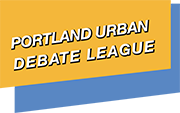About the Portland Urban Debate League
About Urban Debate
What is Debate?
PUDL teaches policy debate which is one type of debating style. In policy debate, two students form a team. One school can enter multiple teams at a competition, called a tournament. Coaches partner students who can work well together and complement each other’s strengths and weaknesses. The debaters and coaches have the debate topic for weeks or months in advance and research and prepare arguments for both sides, the affirmative and the negative, of their topic. Both partners work on both sides together, under their coach’s supervision and with his/her feedback.
At a tournament, teams are assigned to a side and randomly assigned an opponent from a different school. Multiple schools compete at a tournament. One debate is called a round and lasts less than two hours. All debaters speak twice. Each debater’s initial speech, the Constructive, is highly structured and built upon his research. The second speech, the Rebuttal, is more responsive, requiring adaptation to his opponent’s’ arguments. Every debater also participates in two cross-examinations by and of their opponents. Cross-examination involves a lot of quick thinking, as well as civility and toughness. A judge, often a former debater herself, listens to the arguments quietly and keeps time. At the end, the judge critiques the arguments presented and writes down a decision, naming a winner and assigning points.
Every team switches sides for the next round and is assigned a new opponent and judge. Teams will have several rounds, alternating sides, during a tournament. The best debaters–who have winning records and the highest points–are recognized at the awards ceremony that ends a tournament. Debaters and coaches afterward get the written feedback from judges to read and analyze. Coaches debrief the debaters on how to improve their arguments and presentation skills for the next tournament.
What is an Urban Debate League?
An Urban Debate League, or U.D.L., exists to support schools in its city to set up debate programs. U.D.L.s run workshops for students and teachers, provide financial support to programs, and offer competitions. Although these aims and activities are broadly similar across the U.S., the exact details of how each U.D.L. is modeled differ from city to city based on the school districts involved, the broader debate community, and university affiliates. Some U.D.L.s are tightly connected to non-U.D.L. competitions; some run entirely separate competitions. Some U.D.L.s partner with one university, some affiliate with many local universities and colleges, and some are independent. Despite these differences, all U.D.L.s exist to bring the wonder and joy of debate competitions to schools that have not participated in the past.
The first U.D.L. started in Detroit in 1984, a partnership between Detroit Public Schools and Wayne State University (Warner & Bruschke, “Gone on Debating”, Contemporary Argumentation and Debate, 2001). Atlanta and Emory University followed in 1985, and then expanded into middle schools in 1995. That year, 1995, also marked the moment when the U.D.L. concept was deployed to new cities, such as New York (Cridland-Hughes, “The Atlanta Urban Debate League”, American Educational History Journal, 2016). Urban debate leagues now exist in 22 major U.S. cities (National Association of Urban Debate Leagues, accessed March 2017). Many of these U.D.L.s have existed for decades. They continue to operate so successfully because debate engages students and delivers real educational benefits, as decades of research attests.
